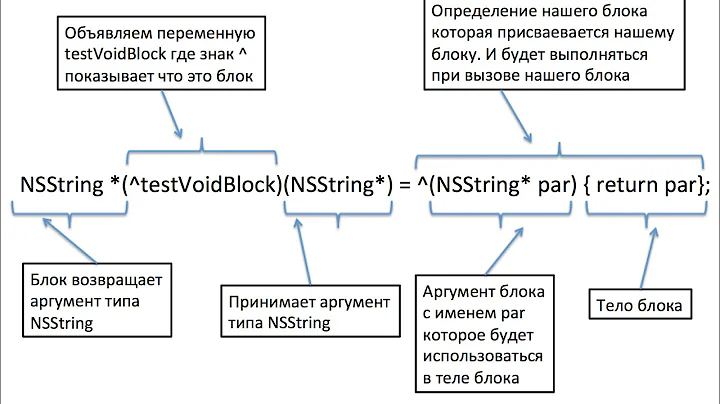Using __block and __weak
Solution 1
__block is a storage qualifier. It specifies that the variable should directly be captured by the block as opposed to copying it. This is useful in case you need to modify the original variable, as in the following example
__block NSString *aString = @"Hey!";
void(^aBlock)() = ^{ aString = @"Hello!" }; // without __block you couldn't modify aString
NSLog(@"%@", aString); // Hey!
aBlock();
NSLog(@"%@", aString); // Hello!
In ARC this causes the variable to be automatically retained, so that it can be safely referenced within the block implementation. In the previous example, then, aString is sent a retain message when captured in the block context.
Note that this isn't true in MRC (Manual Reference Counting), where the variable is referenced without being retained.
Marking it as __weak causes the variable not to be retained, so the block directly refers to it but without retaining it. This is potentially dangerous since in case the block lives longer than the variable, since it will be referring to garbage memory (and likely to crash).
Here's the relevant paragraph from the clang doc:
In the Objective-C and Objective-C++ languages, we allow the
__weakspecifier for__blockvariables of object type. [...] This qualifier causes these variables to be kept without retain messages being sent. This knowingly leads to dangling pointers if the Block (or a copy) outlives the lifetime of this object.
Finally the claim that __block can be used to avoid strong reference cycles (aka retain cycles) is plain wrong in an ARC context. Due to the fact that in ARC __block causes the variable to be strongly referenced, it's actually more likely to cause them.
For instance in MRC this code breaks a retain cycle
__block typeof(self) blockSelf = self; //this would retain self in ARC!
[self methodThatTakesABlock:^ {
[blockSelf doSomething];
}];
whereas to achieve the same result in ARC, you normally do
__weak typeof(self) weakSelf = self;
[self methodThatTakesABlock:^ {
[weakSelf doSomething];
}];
Solution 2
You should use __block if you want to change variable value in block.
e.g:
__block BOOL result = NO;
dispatch_sync(dispatch_get_main_queue(), ^{
...
result = YES;
...
});
You should use __weak if you want to avoid retain cycles.
e.g.:
__weak typeof(self) wself = self;
self.foobarCompletion = ^{
...
wself.foo = YES;
...
};
You can combine them if there is a need.
Related videos on Youtube
Adam
Updated on July 14, 2022Comments
-
 Adam almost 2 years
Adam almost 2 yearsI've read over this thread: What does the "__block" keyword mean? which discusses what
__blockis used for but I'm confused about one of the answers. It says__blockis used to avoid retain cycles, but the comments underneath it leave me unsure.I'm using it something like this:
self.someProperty = x; //where x is some object (id) __block __weak VP_User *this = self; //begin a callback-style block this.someProperty = nil;Do I need to use both
__blockand__weak? Any glaring problems with this way this looks?-
trojanfoe over 10 yearsNo it probably says "
__weakis used to avoid retain cycles". -
 Adam over 10 yearsActually one of the answers (upvoted, but not accepted) says "
Adam over 10 yearsActually one of the answers (upvoted, but not accepted) says "__blockis sometimes used to avoid retain cycles" -
trojanfoe over 10 yearsI don't understand that; using
__weakis the way to avoid that. -
 Adam over 10 yearsMe neither - hence this thread asking for clarification. Is it okay to use both?
Adam over 10 yearsMe neither - hence this thread asking for clarification. Is it okay to use both? -
trojanfoe over 10 yearsI think so; they are different things and the issue with retain cycles is normally for code within the block, not outside of it.
-
 Martin R over 10 yearsPerhaps the confusion stems from the fact that in Manual Reference Counting, the __block specifier indeed causes the object not to be retained and thus can avoid a retain cycle. This behavior is different in ARC (which is documented somewhere in the "Transitioning to ARC Release Notes").
Martin R over 10 yearsPerhaps the confusion stems from the fact that in Manual Reference Counting, the __block specifier indeed causes the object not to be retained and thus can avoid a retain cycle. This behavior is different in ARC (which is documented somewhere in the "Transitioning to ARC Release Notes"). -
 Gabriele Petronella over 10 years@MartinR exactly. In MRC, for instance, declaring a
Gabriele Petronella over 10 years@MartinR exactly. In MRC, for instance, declaring a__blockreference toselfbreaks potential retain cycles. I added an example in my answer to clarify this.
-
-
 Adam over 10 yearsSo, if I am reading this correctly, it doesn't make sense to use __block and __weak together because they, in fact, do opposite things (in ARC)?
Adam over 10 yearsSo, if I am reading this correctly, it doesn't make sense to use __block and __weak together because they, in fact, do opposite things (in ARC)? -
 Gabriele Petronella over 10 yearsNo. It may make sense in case you want to modify an object within a block, but holding a reference to it would cause a retain cycle. I cannot come up with a good example, but there might exist a legitimate use. That's why it's allowed, even though potentially unsafe, as the documentation remarks.
Gabriele Petronella over 10 yearsNo. It may make sense in case you want to modify an object within a block, but holding a reference to it would cause a retain cycle. I cannot come up with a good example, but there might exist a legitimate use. That's why it's allowed, even though potentially unsafe, as the documentation remarks. -
Hot Licks over 10 years"In ARC this causes the variable to be automatically retained" How does retaining the variable work? The "variable" that needs to be kept accessible is the pointer
*aString, not an object. How do you retain a pointer? -
 Gabriele Petronella over 10 yearsNot sure I'm fully understanding your question. As far as I know it sends
Gabriele Petronella over 10 yearsNot sure I'm fully understanding your question. As far as I know it sendsretaintoaString. -
 Gabriele Petronella over 10 yearsAlso if a block is moved to the heap,
Gabriele Petronella over 10 yearsAlso if a block is moved to the heap,__blockvariables are transparently moved as well -
Hot Licks over 10 yearsSending retain to aString only retains the object containing "Hey!" The pointer
*aStringpresumably has some existence scope that needs to extend through the existence of the block and also through the existence of the calling procedure. How is that managed? -
 Gabriele Petronella over 10 yearsAs I said
Gabriele Petronella over 10 yearsAs I said__blockvariables can be moved around "magically". If the block outlives the scope of the variable by being copied on the heap, every__blockvariable it captures is moved to the heap as well. Bottom line, the trick is that__blockvariables can mutate their address over time. -
newacct over 10 years@HotLicks:
*aStringis not a variable.aStringis a variable. -
 Ferran Maylinch almost 9 yearsIf I'm not wrong, for a retain cycle to occur you would have to keep a direct or indirect reference to the block in
Ferran Maylinch almost 9 yearsIf I'm not wrong, for a retain cycle to occur you would have to keep a direct or indirect reference to the block inself(e.g.self.block = block). So a retain cycle is not created just by usingselfinside the block. You don't need aweakSelfif you don't store the block. -
 Ash over 7 years@Ferran That is my understanding of retain cycles involving blocks, as well.
Ash over 7 years@Ferran That is my understanding of retain cycles involving blocks, as well.










